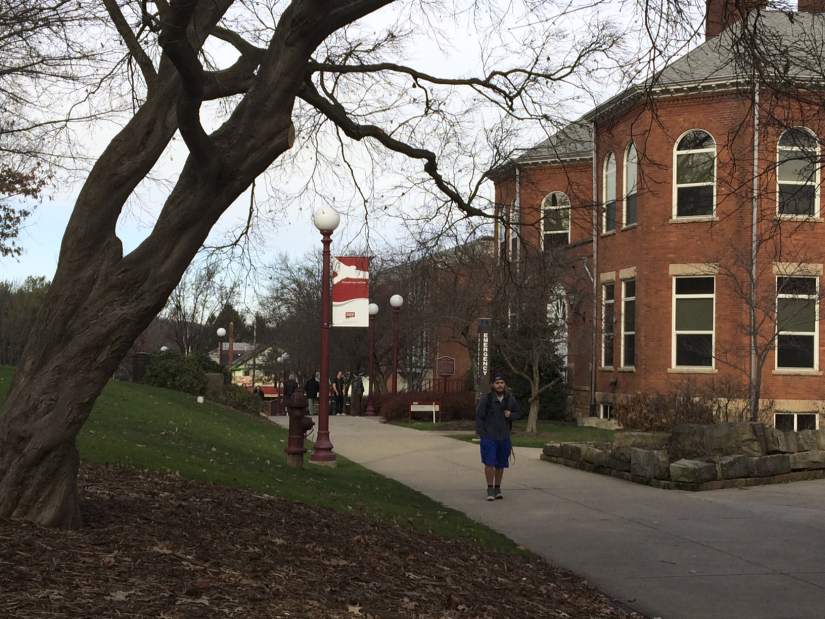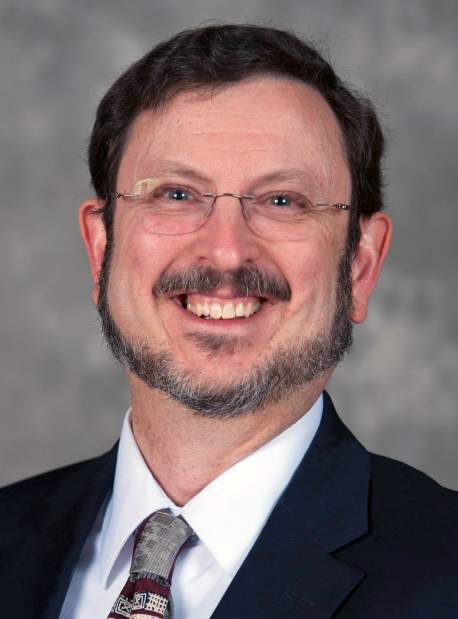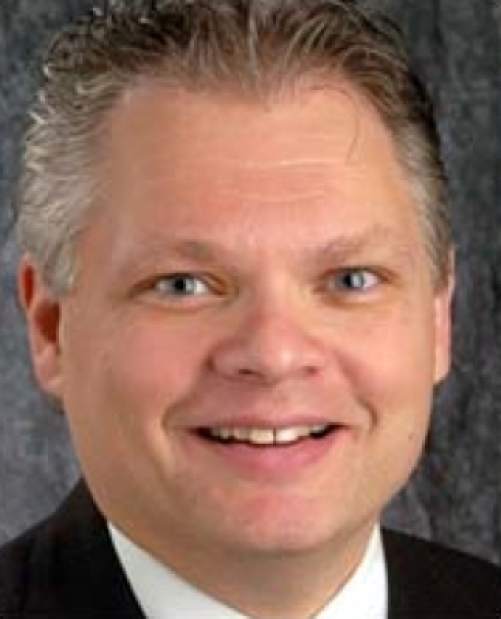Probe raises red flags on spending by IUP dean
INDIANA — An Indiana University of Pennsylvania dean and his wife are involved in questionable spending of public funds — similar to abuses uncovered in a scathing audit at San Jose State University, where he worked previously, a Tribune-Review investigation found.
Victoria Lynn Travis, wife of Mark E. Correia, dean of IUP's College of Health and Human Services, got a lucrative contract for computer work at the university 11 weeks after IUP received a copy of an official audit and a warning from San Jose State officials about her and her husband. Travis was the sole subcontractor on work awarded to B-Three Solutions of Plum for IUP's part of a data integration plan linking all 14 of the Pennsylvania State System of Higher Education's universities.
Doug Nesler, B-Three's chief operating officer, told the Trib that Travis did “wonderful work” but he did not know until a Trib reporter called that she was married to an IUP dean. Nesler said that IUP Chief Information Officer Bill Balint “pointed us in the direction of her and steered her toward us.”
Between Jan. 11 and Oct. 7, 2015, Pennsylvania taxpayers spent $32,743.27 on the B-Three contract, according to IUP billing documents reviewed by the Trib. Nearly all of the payments went to Travis, who was a candidate for a pharmacology doctorate at Creighton University and serving as a student intern at Rio Rico Pharmacy & Gas near the Arizona border with Mexico when she landed the IUP consulting deal.
Among Travis' $1,903.27 in expenses were airfare to fly from a home Correia owns in Arizona to Pittsburgh and a rental car to drive to Indiana. IUP also paid for her lodging and meals, even though the couple owns a $282,000 home on Edgewood Avenue.
Correia, 48, whose salary is $170,461 this year, and Travis, 46, did not return numerous telephone, emailed and written messages seeking comment.
Balint, who approved all payments on the billable hours Travis submitted, told the Trib in an interview that he knew she was Correia's wife. He said he would “love to clarify” how she got the subcontract work, but needed IUP's media and public relations spokesperson Michelle Fryling to approve the Trib's interview request.
Fryling declined, saying the university must remain mum on the matter because state ethics investigators might review the contract.
IUP President Michael A. Driscoll and Timothy S. Moerland, the provost and vice president for academic affairs, declined numerous requests for comment. Fryling defended IUP's decision to retain Correia after learning of the California probe.
“Both the president and the provost reviewed all information available to them in the fall of 2014 and made appropriate personnel decisions,” she said.
IUP documents show Balint worked closely with Correia on an IUP technology initiative in Trinidad & Tobago, a sunny Caribbean nation that Correia had visited on a 2014 taxpayer-funded trip, according to college travel invoices and receipts from the dean's state-issued credit card.
Receipts reviewed by the Trib reveal frequent trips throughout the dean's tenure at IUP — including conferences and program development ventures in Jamaica, Florida and one in Arizona, where Correia owns that $320,878 home, according to Santa Cruz County real estate documents.
Special attention?
A Trib analysis of IUP documents — including 2,014 travel charges from Correia's College of Health and Human Services between 2013 and late 2015 — indicate that Correia provided professional perks to a female professor who transferred to his college and used university funds for travel with her. He was accused of providing similar benefits to a female instructor at San Jose State.
Receipts for April 2015 showed trips by Correia to the Specialty Coffee Association of American Conference in Seattle and his alma mater, Washington State University, totaling $3,404. He was accompanied by a female professor who professors say had developed a friendship with the dean.
Unlike the majority of travel vouchers submitted by IUP professors that the Trib reviewed, hers was not signed by a department chair. Rather, Correia signed the vouchers, and the travel was funded by a budget he oversaw, IUP database and supporting documents show.
Provost Moerland, who approved Correia's travel, never returned Trib phone calls trying to determine the purpose of the dean's attendance at a coffee conference and the side trip to the dean's alma mater.
IUP's Fryling said the university earmarked the “funding for the potential development of specialty programs in hospitality and culinary studies.”
Other high-ranking IUP officials declined to comment publicly on the matter when approached by the Trib, pointing out that there are no laws barring deans from pursuing nonwork relationships with junior professors they supervise. They added that Correia had been counseled about his judgment involving the female professor.
While the dean and the female professor were in Washington state, an IUP committee of her peers was forming to review whether her teaching contract should be renewed, part of a five-year program that could end with tenured status.
Through a 2014 intra-departmental transfer within IUP's College of Health and Human Services, Correia had credited her with two years of service toward her tenure in her new department, even though she had not been teaching there. Typically, faculty within the department would vote on such a decision, according to several department chairs interviewed by the Trib.
The female professor turned a Trib reporter away from her office, saying that IUP public affairs officials would speak on her behalf. They declined to do so.
“The relationship she had with the dean came as a real surprise to me,” said Linda Parrish Sullivan, an assistant professor in the college's Hospitality Management Department and the leader of the evaluation panel. “I think I was the last to know.”
Sullivan said she fretted that Correia might punish her, others on the committee or their college departments if they gave the female professor a bad recommendation. Ultimately, however, Sullivan said, she submitted a report “that wasn't glowing, but was fair” and recommended that the instructor be retained for another year.
The female professor filed a rebuttal to the report. As dean, Correia was poised to make the final decision on the subject — something Sullivan thought was unfair.
“All we did was try to do the right thing, to be professional and do the right thing,” Sullivan said.
She said she later learned that Correia's superiors removed him from the retention review.
The recommendation then fell to Mary Williams, Correia's assistant dean of IUP's College of Health and Human Services. Williams ruled Dec. 3 that the female professor's contract should not be renewed for next year. Williams declined to respond to multiple messages.
The case now goes to Provost Moerland and President Driscoll, the men who hired Correia. Fryling said that IUP officials “are not aware of any violation” of the collective bargaining agreement that guides the faculty renewal and retention process and declined to comment further on what they consider a personnel matter.
Correia, aware of the Trib investigation, began meeting with the nine faculty chairs within his college last week after some talk of a possible vote of no confidence in him arose. Even if IUP were to decide not to renew Correia's contract as dean when it expires in 2016, he can still become a tenured professor in the school's Criminology Department under the terms of the deal that brought him here from San Jose State.
San Jose shenanigans
More than a year after Correia left San Jose and the California State University system, investigators on Sept. 16, 2014, released a scathing audit into his stewardship as chair of the university's Justice Studies department.
They found that Correia dipped into off-campus college bank accounts — forbidden by California regulations — to buy Apple electronics, flowers, theater tickets, massage sessions at nearby spas, premium social media accounts, donations for the environmental group Greenpeace and even to pay his parking tickets.
The audit also revealed that he engaged “in a conflict of interest by hiring a vendor ... with whom he had a personal and financial relationship” and accepted $19,805 in additional compensation to oversee the work.
The vendor was Travis, then Correia's live-in girlfriend, according to internal San Jose State investigative files.
Correia gave her a $25,000 website development contract. Another $20,000 went to the husband of a woman identified in the supplemental investigative documents as a junior instructor in Correia's department whose pursuit of tenure he was helping guide.
Written complaints and affidavits filed by San Jose State employees and students paint Correia's department as a “toxic environment” marked by “corruption,” “sexual harassment” and rampant cronyism.
Correia reimbursed the university for $7,131 in improper personal spending that officials traced to him, though investigators determined that a total $67,460 in expenditures directed by Correia lacked “a clear benefit or relationship to continuing education programs.”
He did not repay San Jose State the nearly $20,000 received to oversee Travis' work and was never charged with any crimes.
On Oct. 6, 2014, two professors in the San Jose State Justice Studies department — Christopher Hebert and Yoko Baba — said they mailed a copy of the audit to IUP President Driscoll. In an attached letter, they warned Driscoll about Correia's payments to special consultants and cautioned that the dean “is not the person you thought he was” when IUP hired him.
It should not have come as a surprise. San Jose State Provost Andrew Feinstein reached out to IUP's Moerland in a July 2014 telephone call to brief him about Correia and the findings of the audit months before its release, according to spokeswoman Patricia Harris.
Carl Prine is an investigative reporter for Trib Total Media. He can be reached atcprine@tribweb.com or 412-320-7826.






